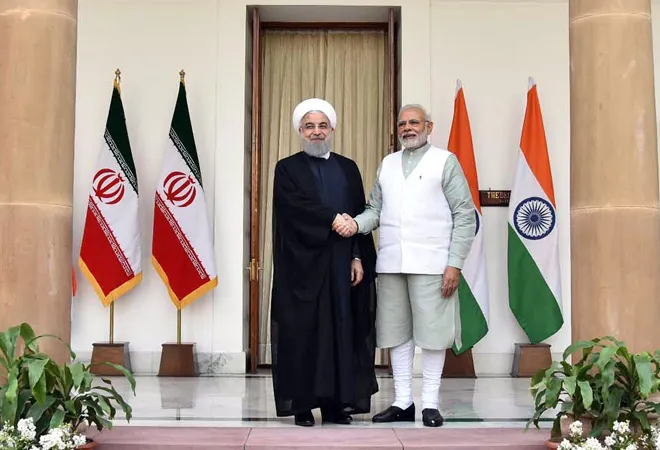Ripples in the India-Iran bilateral relationship have risen to the surface once again, forcing the question of whether India's policy and commitment towards the development of the Chabahar Port project is unraveling. Three days after Iran's announcement that it was starting work - finally, alone - on a crucial rail link between Zahedan and Chabahar that India had committed to developing jointly in 2016, the Foreign Ministry in Delhi was forced to clarify that it had, in fact, been left to Tehran to nominate an authorized entity to finalize outstanding issues - technical and financial - after a meeting between the two sides in December 2019 to review the railway project.
For most analysts of the India-Iran relationship, Tehran's declaration that it would go it alone, seemingly because India had dragged its feet, was akin to a challenge, seeking a reaffirmation of India's commitment to the development of Chabahar, and yet another example of the sort of hard negotiation Iran engages in with India from time to time.
Against the backdrop of a deadly pandemic, for which China is already on the mat, and subsequently, India's efforts to rally international support against Beijing for its adventurism in the Galwan Valley of Ladakh, Tehran's comments placed Delhi in a diplomatic conundrum in which both Beijing and Washington are key players. Iran's declaration to start work on the rail line alone came on the back of reports of a mega 25-year, 400-billion-dollar-worth Sino-Iranian Comprehensive Strategic Partnership being negotiated between China and Iran that paves the way for Tehran to purchase weapons and military equipment from Beijing. The two countries already have a trade agreement in place, also signed in 2016, just months before the Chabahar Trade and Transport Corridor Agreement between Iran, Afghanistan and India. And now, even if there is both internal (led by the populist Mahmoud Ahmadinejad in Iran's parliament) and international opposition to such a partnership, Delhi needs to evolve a better strategy on Iran beyond waiting to see how the US may react, beyond having to issue clarifications in response to Iran's sudden provocations, and beyond allowing voids of partnership that China will readily fill.
Ever since the 2016 trilateral transport corridor agreement designed to facilitate trade in markets across the wider central Asian region, with the Chabahar Port as its hub, bilateral ties between India and Iran have been tested - on one hand by Tehran's dangling of increasing proximity with Beijing as a geo-strategic challenge to India, and on the other, by Delhi's sometimes awkward balancing of relations with US president Donald Trump, even at the cost of maintaining crucial regional partnerships.
While signing the agreement four years ago, Prime Minister Modi had referred to the Chabahar project as an engine of growth for Iran and India. The trade and transit corridor allows India to access Afghan, Central Asian and Russian markets over land, bypassing Pakistan. But staying on the right side of Donald Trump has meant obstacles in consistent engagement with Iran. As Washington walked out of the landmark JCPOA or Iran Nuclear Deal negotiated by the UN Security Council's Permanent 5 and Germany soon after Trump assumed office (in spite of global opposition), imposed fresh sanctions on Iran, and most recently, killed one of its most prominent military figures, Qasem Soleimani, in a drone strike in Baghdad in early 2020, India-Iran relations have stagnated, and Tehran has begun to drive even harder bargains to ensure its own economic survival.
Civilizational ties that form the bedrock of the bilateral relationship notwithstanding, Tehran has since last year shed past caution on economic and domestic political matters. After India's decision to nullify Article 370, Iranian President Hassan Rouhani said "Kashmir's Muslims must be able to use their own interests and legal rights and be able to live in peace", and called on India and Pakistan to show restraint and prevent the killing of innocent Kashmiris. Tehran's tone has only become bolder since. At the beginning of 2020, Iran sidelined India's ONGC from exploration rights at its Farzad B Gas field, saying it will engage the company at a later date. Barely two months later, in March 2020, in the wake of Delhi's communal riots, Iran's Supreme Leader Ayatollah Khomeini asked India to "confront extremist Hindus and their parties and stop the massacre of Muslims in order to prevent India's isolation from the world of Islam." Whether this is posturing or genuine concern, the reality is that a sense of deepening alienation among India's Muslims who fear religious persecution gives Iran a new lever against India.
Given these realities, and the fact that Tehran is likely banking on a shift in the US political landscape come November, Delhi also needs to ask itself how it will reinvigorate its relationship with Iran if there is a change in the White House. With an increasingly unpopular Donald Trumps seeking re-election even as the Covid-19 pandemic claims more and more lives in America every day, Tehran is hoping for a Democrat win to lighten the sanctions and pick up where it left off in 2016. Any such change in Washington will necessitate a reassessment in Delhi to ensure it makes good on its commitments to an important regional partner, and revives its own definition of the very 'strategic autonomy' that drove the Chabahar project's inception in face of global pressure in the first place, irrespective of how Washington or Beijing may leverage Tehran.
This commentary originally appeared in NDTV.
The views expressed above belong to the author(s). ORF research and analyses now available on Telegram! Click here to access our curated content — blogs, longforms and interviews.




 PREV
PREV


